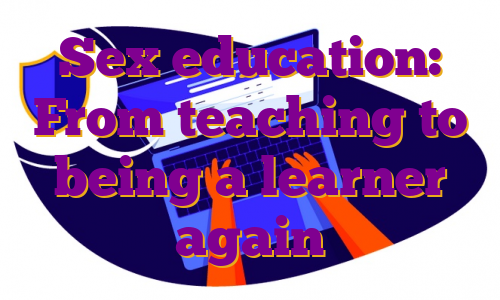When I was an adolescent, talking about anything remotely sexual was taboo. My first memory of trying to talk about sex goes like this. I am in Salem, Tamil Nadu, in my paternal grandparents’ home. It is hot in the ‘children’s room’ of my grandfather’s old sprawling house, and the rickety fan creaks like the rest of the house. It’s a time when the summer holidays seem to go on forever. I am 12, sans cousins or books, and I am bored out of my mind. In sheer desperation, I read old issues of Reader’s Digest. One of them has a story by a recovered addict who describes how he feels after shooting up heroin as “a chemical orgasm”. I ask my mother, “Amma, what is orgasm?” She says, “Show me the word.” Then, without missing a beat she responds, “It’s a spelling mistake. They mean organism.” I learnt two things. First, that my mother could lie effortlessly. Second, that if I had any questions remotely to do with sex ( I suspected that’s what it was about), I needed to look elsewhere for the answers. Later that year, she sat me down after school and over a plate of Chinese food gave me a horrifying account of uteruses that bled and ovaries that made babies. None of it had anything to do with what I really wanted to know, and I couldn’t eat chowmein for years. I muddled along until I entered medical school, and then had my first experience of ‘imposter syndrome’ when my non-medic friends started coming to me for advice on all things to do with the body, including sex. Who was ever going to believe that a medical student with swag knew the mechanics, but lacked operational knowledge? My bestie Evie dredged up some dodgy statistics and we reflected glumly that we were probably part of a tiny percentage of women who were not sexually active in their mid twenties. When I became a mother, I was determined not to let this happen to my kids. So, when the kindergarten teacher in my children’s school said, “We have two eyes and two ears, what do we have just one of?” I wasn’t surprised when my 4-year-old son answered “a penis”. I took it upon myself to educate every single class in my children’s school from grade 5 upwards. It was delightful to have a bunch of 13-year-olds hanging on to my every word. I was amazed by their questions, such a mixture of naivete, curiosity and wisdom. Can you get breast cancer from kissing? How much do porn stars get paid? Whose responsibility is it to use a condom? Cut to a decade later, and we find not much has changed for middle school children. A couple of recent studies in the US asked young adults what they thought was ideal parent-child communication on sex. The answer unsurprisingly was that they wished their parents had had open conversations with them and had had them earlier and more often. But parents today still feel awkward about having ‘the talk’, never having had it themselves. When parents ask where to begin, I tell them to just make it okay for their children to ask questions. They are usually fine if you tell them you need time to think of an answer, but they will remember if you don’t get back to them. They might not ask you again. As the wonderful nurse and educator Meg Hickling says, “Your child really wants to ask these questions and they want to hear the answers from you. Never miss a teachable moment. Celebrate them.” The middle schoolers I did the ‘body science’ sessions with requested me to do a session for their parents. At the parent sessions, it became clear where the children inherited their biases from. A man who yelled during the parent session, “Don’t teach my son about homosexuality! I don’t want you putting ideas in his head” was the father of a 12-year-old boy who called another “faggot” when he missed a catch in a cricket game. My generation needs a different kind of education. We find ourselves unmoored and confused by a rapidly changing world. Over the last few years, young adults and adolescents have been my mentors. They are educating me about their beliefs around sexuality and gender, and these are often different from those of their parents. I am no longer the cool mom or doctor who talks to them candidly about sex. I am the somewhat late-to-arrive learner who has a lot of catching up to do. I am puzzled when people my age roll their eyes and say, “Kids these days—you can’t get anything right!” My experience has been the opposite. ‘Kids these days’ are ever willing to instruct and explain and are okay with my making mistakes. I have learnt from them to think beyond binaries, and to understand gender as well as sexuality as a spectrum. I’ve learnt not to make assumptions about identity, but enquire about preferred names and pronouns. At my daughter’s graduation last month, I watched with envy the easy banter among her friends—diverse in gender, sexuality and in myriad other ways. It was as if there was a mat on the doorstep of their world that said, ‘All are welcome’. Isn’t that what we want for our world? Vibha Krishnamurthy is founder and executive director, Ummeed Child Development Center
Subscribe to Mint Newsletters * Enter a valid email * Thank you for subscribing to our newsletter.
.

